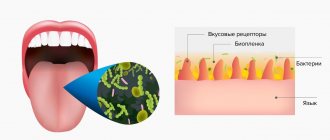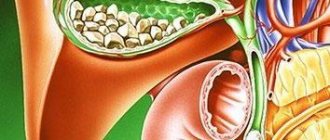Share information with your Facebook friends
VK
Most people experience heartburn occasionally, but if it occurs two or more times a week, you may have gastroesophageal reflux disease (GERD), a term used to describe chronic heartburn. Heartburn is caused by stomach acid that backs up into the esophagus. This is called acid reflux, when the valve separating the esophagus and stomach opens at the wrong time. In everyday speech it is also called acid reflux . This valve dysfunction can be caused by certain foods (such as onions or mint), overeating, smoking and alcohol. A burning sensation in the chest and a sour taste in the mouth are the main symptoms of acid reflux. But some people can have GERD without heartburn. In these cases, symptoms such as chest pain, chronic cough, hoarseness and a feeling that something is stuck in the throat may be signs of acid reflux. Depending on the severity of symptoms, it is treated with diet and lifestyle changes, over-the-counter or home remedies, medications, and/or surgery. It is important to treat GERD because the disease can progress and over time damage the esophageal mucosa, leading to serious complications and adverse events.
Ginger
In moderation, ginger is one of the best foods for acid reflux. It has been used since ancient times as an anti-inflammatory agent and also to treat gastrointestinal disorders. Ginger root can be easily peeled, cut into slices or cubes, and grated. You can use it in cooking, add it to smoothies, drink ginger tea, or snack on ginger gummies.
Causes of sour taste in the mouth in adults
Possible causes of sour taste can be divided into four main categories.
GERD (gastroesophageal reflux disease). Food passes from the mouth, where it is first chewed and processed by saliva, into a narrow tube called the esophagus, and from there to the stomach, where the process of active digestion begins. At the beginning of the stomach there is a small valve that prevents food from flowing back into the esophagus from the stomach. The valve is called the lower esophageal sphincter or LES. In people with gastroesophageal reflux disease, or GERD, it does not open quite correctly, allowing food to enter the esophagus from the stomach. GERD causes various symptoms such as heartburn, chest pain, sour or bitter taste, bad breath, burning sensation in the stomach. throat, difficulty swallowing, sensation of a lump in the throat, cough and hoarse voice. There are various causes of GERD, such as heavy overeating, sour foods, fatty foods, regular consumption of caffeine, alcohol abuse, regular smoking, pregnancy, obesity, etc.
Medicines. Some medications taken for other medical conditions may leave residues in the mouth or affect the taste buds in the brain or tongue. This may cause a sour taste in the mouth. Experts have found that there are more than 250 different medications that can cause a sour taste in the mouth. They can be classified as:
- Antibiotics are the most common culprit, examples include sulfamethoxazole, tetracycline, trimethoprim, ampicillin, metronidazole, etc.;
- medicines prescribed as part of chemotherapy, such as etoposide, cyclophosphamide and cisplatin;
- medications used for neurological diseases such as Parkinson's disease, migraine, etc., as well as some muscle relaxants;
- medications prescribed for cardiovascular diseases such as high blood pressure, irregular heartbeat, diuretics, statins, etc.
- prescription and over-the-counter medications such as antihistamines, bronchodilators, and medications to treat inflammation, smoking addiction, and fungal and viral infections;
- medications prescribed for psychological conditions such as depression, anxiety, bipolar disorder, and mood stabilizers and sleeping pills.
Gum inflammation
How to deal with bleeding gums at home
Zinc deficiency. Zinc is one of those minerals that the body needs (albeit in small quantities) for good health. They come from the foods we eat, such as red meat, shellfish, dairy products, nuts, beans, oysters, legumes and some vegetables. Zinc deficiency can occur if a person does not get enough zinc in their diet, zinc is not absorbed properly in the intestines, or a person takes medications that interfere with the absorption of zinc. These include thiazide diuretics, captopril (ACE inhibitor) and penicillamine. These drugs are used to treat a wide range of diseases, such as cancer, diabetes, liver disease, celiac disease, chronic kidney disease, pancreatitis, sickle cell disease, Crohn's disease and ulcerative colitis.
Other reasons. There are countless other conditions or causes of sour taste in the mouth, some of them are:
- Smoking or chewing tobacco can affect your taste buds over time and make food less palatable;
- some people suffer from decreased saliva production, which creates an incorrect perception of taste - a condition called xerostomia or dry mouth syndrome; xerostomia can be caused by dehydration, which causes dry mouth mucous membranes to cause a sour taste in the mouth;
- anxiety and stress, as these can cause dry mouth;
Oral diseases
KP Handbook on the main diseases of teeth and gums
- various infections or diseases cause inflammation, which can increase the sensation of sour taste or create an incorrect perception of taste;
- fungal infections in the mouth such as oral candidiasis;
- Failure to brush your teeth regularly or practice good oral hygiene can cause a sour taste in your mouth;
- In women, pregnancy and menopause are known to cause a sour taste in the mouth due to hormonal changes;
- menopause, which, like pregnancy, can cause a sour taste in the mouth due to changes in hormone levels;
- brain injury or surgery can affect the area that controls taste perception and create incorrect taste perception;
- neurological disorders such as dementia, Bell's palsy, epilepsy, multiple sclerosis, and brain tumors;
- Radiation therapy used to treat head and neck cancer can damage salivary tissue and cause a sour taste in the mouth.
- lead poisoning due to excessively lead-contaminated water or air;
- syndromes that are not fully understood, such as pine nut syndrome or burning mouth syndrome.
On a note
Metallic taste in the mouth in adults: which doctor should I contact?
Aloe vera
Aloe vera is known to be a natural healing agent and also fights acid reflux in addition. This remedy is available as a live plant, but sometimes the leaves and liquid form of Aloe Vera are sold separately in grocery and health food stores. Aloe vera is used in formulations as a thickener or as a means to set liquids.
Treatment of sour taste in the mouth in adults
As you can see from the above, recurring cases of sour taste in the mouth are not a simple condition that can be relieved with home remedies or antacids.
Consult a gastroenterologist or physician. The doctor will carefully diagnose the underlying disease and then prescribe the correct course of treatment to achieve the best results.
Diagnostics
Identifying the exact cause is a multi-step procedure that includes:
- reviewing your medical history, reviewing your medications;
- examination of the head, neck and mouth.
Your doctor may subsequently order several additional tests.
Bitterness in the mouth
A feeling of bitterness in the mouth in adults may indicate various diseases.
Various taste tests are carried out. The patient is asked to taste sweet, salty, sour and bitter taste solutions to determine their quality and intensity in order to assess taste sensations.
If a bacterial or fungal infection is suspected, smears are sometimes done.
In some cases, head trauma can affect the nerves supplying the taste buds and cause a change or loss of taste. In these cases, a CT scan or MRI may be required.
Blood or urine tests are done to diagnose any underlying medical conditions.
Modern methods of treatment
Treatment for taste disturbance depends on the underlying cause.
If the sour taste or any change in taste is caused by medication, it is recommended to review the patient's medical history and evaluate changes in medication use.
If it is caused by a chronic disease or condition, evaluation and treatment for the condition is recommended.
Zinc supplements are prescribed to patients with zinc deficiency, and according to some studies, they are even prescribed to patients with unknown causes of taste changes.
Changes in taste due to radiation therapy or chemotherapy will gradually decrease several months after treatment is stopped. These patients may also benefit from zinc supplementation.
The sour taste in the mouth after brushing your teeth or any dental treatment is temporary and goes away on its own after a few hours.
Smell from the mouth
What bad breath in adults can indicate: doctors named the causes of halitosis
Fennel
Fennel (pH 6.9) Anise-flavored dill, great food for acid reflux, actually improves stomach function. This crunchy vegetable has a unique taste - a mild licorice flavor. Sliced thin (white bottom), it makes Arugula and Spinach Salad a healthy choice. It's also great for chicken dishes and appetizers, as long as you like that licorice (licorice root) flavor.
Preventing sour taste in the mouth in adults at home
Here are some common, tried-and-true tips and measures to reduce the sour taste in your mouth:
- Maintaining good oral hygiene, which includes brushing twice daily, flossing, tongue brushing, and mouth rinsing, helps reduce bad taste if it is caused by gum disease or other oral infections;
- Chewing sugar-free gum and drinking more water can help relieve dry mouth and change your sense of taste.
During pregnancy
At this stage, significant changes occur within the female body, since the functioning of most organs is reconstructed or various pathological processes are formed.
Basically, the milky taste during pregnancy is a consequence of the formation of gestational diabetes.
Since the pancreas is not able to cope with stress, the sugar content in urine, bloodstream, and saliva increases, which leads to the occurrence of this condition.
Gestational diabetes can be caused by:
- late pregnancy;
- chronic gastrointestinal diseases;
- excessive body weight in a pregnant woman;
- malformations in previous pregnancies;
- the fruit is too large;
- pancreatitis or polyhydramnios.
Diagnostics
In order to determine the cause of sour taste in men , it is necessary to undergo a comprehensive examination, which will exclude or confirm certain diseases. Comprehensive diagnostics includes the following activities:
- esophagogastroduodenoscopy (most informative for diagnosing gastric ulcers ;
- gastric pH-metry;
- ultrasound examination of the abdominal organs, including the liver and gallbladder;
- ultrasound examination of the pancreas;
- biochemical blood test, including liver tests and assessment of pancreatic enzyme levels;
- general clinical blood test;
- assessing blood glucose levels;
- consultation with a neurologist, endocrinologist, gastroenterologist, hepatologist;
- analysis for glycosylated hemoglobin.
Tip #4: Get tested
The taste of acetone in the mouth almost always has not the most harmless causes, so this situation cannot be ignored. Try to contact your local physician as soon as possible, who will give you directions for blood tests (in particular, to check your condition and glucose levels), and urine tests (to detect ketone bodies). Ultrasound, instrumental research methods, and biochemistry may also be additionally recommended.
To identify the problem, it is necessary to undergo tests
For those who are in a hurry and want to test themselves before the doctors, you can resort to using special test strips for acetone. Buy them at any pharmacy and compare the results with the data presented in the product description.
“I developed an acetone taste in my mouth during pregnancy, and ketones were found in my urine. This happened in the first weeks, until about the twelfth. My doctor attributed it to the terrible toxicosis that I developed. Of course, she kept me under control, but I have to give her credit, although she didn’t scare me with all sorts of horrors, as they usually like to do. During this period, no food entered my mouth at all, everything asked to be returned, which means (as the doctor explained), that’s why these substances were produced, as if from starvation. Then I gradually began to eat and drink, and everything went away.”
Marina, review from the babyblog.ru forum
Metal
The reason may be unhealthy teeth or gums.
A metallic taste in the mouth can be caused by metal crowns or fragments of dentures. In this case, you should discuss with your dentist the issue of replacing them. When making a diagnosis, exclude:
- diseases of the periodontium and maxillofacial system with obvious signs of a purulent process;
- bleeding from the gums;
- poisoning with salts of heavy metals - such taste sensations are caused by mercury, zinc, arsenic, copper;
- diabetes mellitus in the stage of decompensation with a slight change in blood sugar levels;
- Iron-deficiency anemia;
- chronic bleeding due to stomach ulcers;
- hormonal disorders;
- taking certain medications. The appearance of such sensations is facilitated by drugs from the NSAID group and anticonvulsants. When the drug is discontinued, the metallic taste disappears on its own.
Tip #5: Take Treatment Seriously
Naturally, treatment must be prescribed by a doctor. The set of therapeutic measures for each patient will be determined individually and according to the clinical situation, but first of all, the doctor will prescribe medications and liquids that will help stop intoxication of the body and remove harmful substances from it.
Then you will have to go for treatment and observation to a highly specialized specialist, for example, a gastroenterologist or endocrinologist. You will also additionally need to follow a plant-based diet, exclude fatty and heavy foods, and no fasting is allowed.
Notice
: Undefined variable: post_id in
/home/c/ch75405/public_html/wp-content/themes/UltraSmile/single-item.php
on line
45 Notice
: Undefined variable: full in
/home/c/ch75405/public_html/wp-content /themes/UltraSmile/single-item.php
on line
46
Rate this article:
( 8 ratings, average: 4.50 out of 5)
prevention
Popular questions and answers
Dentist Yulia Lapushkina answered popular questions about the sour taste in the mouth
Is a sour taste in the mouth dangerous?
The oral cavity is part of the digestive tract, and all organs of this system are distinguished by morphological unity.
More often, a sour taste is one of the symptoms of diseases of the digestive tract. That is why the participation of a gastroenterologist in treatment is mandatory. However, if dental treatment is ignored, recovery does not occur as quickly as we would like. Indeed, against the background of diseases of the digestive tract, the oral cavity also suffers, which can also cause unpleasant tastes, for example, bitter and even metallic. To break this vicious circle, the participation of several specialists and an integrated approach to treatment is necessary. Sometimes the cause of a sour taste is difficult to find. Even against the background of relative health, the taste does not disappear and then its cause must be sought in the oral cavity, namely in orthopedic structures. Due to potential differences, galvanic currents can form, affecting the mucous membrane and causing unpleasant tastes, and not only sour ones.
What foods can cause a sour taste in the mouth?
Foods that can cause a sour taste in the mouth: Reducing your intake of foods with a sour or bitter taste, such as red meat, coffee and tea, should be reduced.
A nutrient-rich diet including eggs, dairy products, fish, fruits and vegetables will help. Adding herbs and spices to food will enhance its taste.
What diseases can cause a sour taste in the mouth?
A sour taste in the mouth can be a natural reaction to eating sour food, or it can be a symptom of a disease.
The main reasons: diseases of the oral cavity, gastrointestinal tract, taking medications or dietary supplements. One of the most common causes of sour taste is gastroesophageal reflex disease (GERD). It is associated with insufficiency of the lower esophageal sphincter, which results in the reflux of acidic stomach contents (hydrochloric acid) into the esophagus and oral cavity. Also, a sour taste may appear without reflux, then they talk about functional heartburn. This condition is based on nervous mechanisms: incorrect perception of ordinary stimuli by the nervous system.
Functional reflux can also include the appearance of a sour taste in pregnant women. This is due to increased intra-abdominal pressure due to an enlarged uterus. As a rule, this symptom goes away after childbirth.
If bitterness is added to the sour taste, then you need to look for the reason in the functioning of the gallbladder. Sweetish taste – problems of the pancreas.
Another group of reasons may be changes in the oral cavity due to the proliferation of pathogenic flora during gingivitis, stomatitis, and caries. Therefore, it is also necessary to contact a dentist and ENT specialist.
Is it possible to eliminate the sour taste in the mouth using traditional methods?
Eliminating a sour taste largely depends on the cause. Normalizing nutrition is an important step in maintaining health, regardless of the presence or absence of symptoms. Quitting smoking and alcohol can also normalize taste. You can often hear recommendations for taking soda, but doctors do not recommend dulling the symptoms; it is better to understand the causes and eliminate it.











